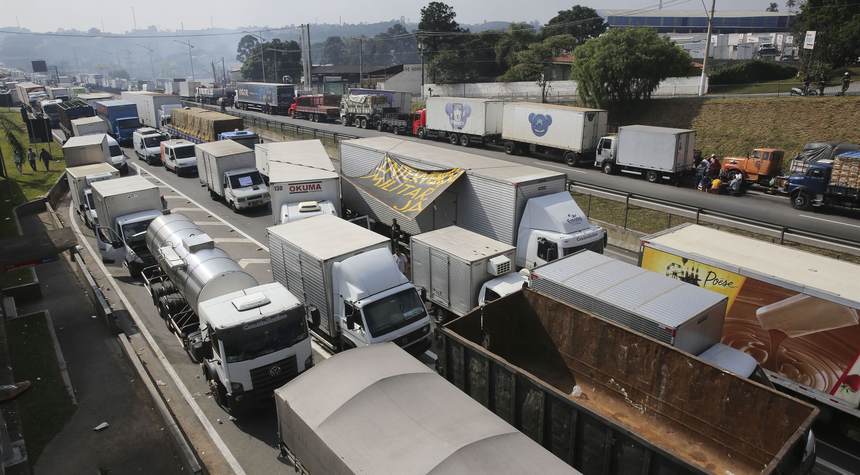The New York Times Exposes Media Hypocrisy as It Echoes Tom Cotton in Call to End Trucker Protest

Does the New York Times forget that this kind of language threatens their own staffers?
The Canadian truckers protest has been a revelatory exercise in the fluid nature of our politics. Positions held regarding activities have flipped rather easily, and the abrupt switch has been seen on both sides. For myself, I see my support for the resistance to governmental overreach hitting a snag when it comes to clogging major roadways and impacting emergency services.
But the real amusement in this is seen in the media, which has no problem looking at the issue and noting the hypocrisy seen on the right and in conservative media circles, but they appear incapable of locating any mirrors. On Friday in my Townhall media column, I gave numerous examples of media distemper regarding this protest, yet as they rail about Fox News suddenly approving of occupying protestors, these same scolds in the press cannot see their own 180-degree positional shift.
What happened to the blind support of citizens expressing their disdain for the government? Where is the glowing approval of AOC-type backing in saying the purpose of protests is to make the government uncomfortable? And just how can journalists decry the potential for violence in Ottawa, after waving pom-poms in front of auto parts stores engulfed in flames? Now, in taking this contradictory editorializing to laughable heights, the New York Times arrives with its hot take on the matter, and it should become an embarrassment for the paper.
In a report on the breadth of the protest and the impacts on our commerce, the Times gives a lengthy rundown. What becomes exposed is just how the paper sells this disruption. Look over this summation and see if it does not sound eerily familiar to a previous position seen in the same periodical.
The curiosity is that this is essentially the exact same thing that was printed in the exact same newspaper in June of 2020, and at that time, this type of suggestion created a firestorm within the Times’ offices. Senator Tom Cotton wrote about the numerous protests we had seen across the country, and he was addressing the violence witnessed in numerous cities, and the attacks taking place upon numerous federal buildings. The reaction to his op-ed was amazing.
Staffers at the Times were outraged, protesting that the paper gave column inches to a conservative who wanted to impact the rights of citizens with such an inflammatory suggestion. Then things went from ridiculous to hysterical, with many at the paper suggesting that the printing of the column served as a direct threat to them.
Warning: tweet contains coarse language.
There were numerous attempts by the paper, after the fact, to suggest they had somehow been duped by Cotton. Opinion writer Kara Swisher stated the piece was, “jaw-droppingly titled “Send In the Troops,” sounding as if everyone at the paper was surprised by this only post-publication. The claim was that the understaffed editorial division was rushed to print his piece; the time it would take to read the column was apparently too slim. Of course, there was ample time to write follow-up editorials and explanatory pieces, so this understaffing seems a bit selective in the editorial division.
Now, the Times feels perfectly at ease saying that authorities should be sent in to disperse an organized protest, and somehow no one appears to be threatened. Promoting a governmental intrusion is not seen as launching, “a metaphorical tear-gas canister into a tense national crisis,” as Cotton’s identical suggestion had been described two summers back. No, this is completely different. We are just not told how.
In another op-ed this week, from the paper’s editorial board, they again took the stance that governmental involvement was justified.
Governments have a responsibility to prevent violence by protesters, but they must be willing to accept some degree of disruption by those seeking to be heard. The challenge for public officials…is to maintain a balance between public health and safety and a functioning society, with the right to free expression.
The Times should have added another phrase to this editorial – That is our position on such topics today.
No comments:
Post a Comment